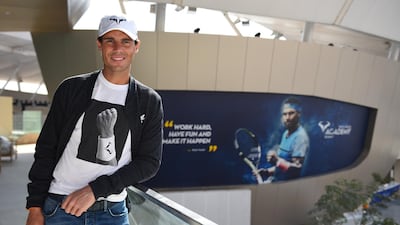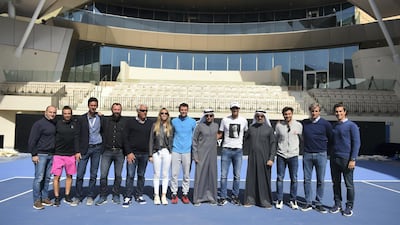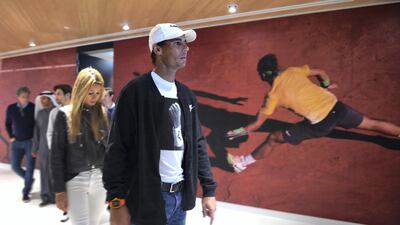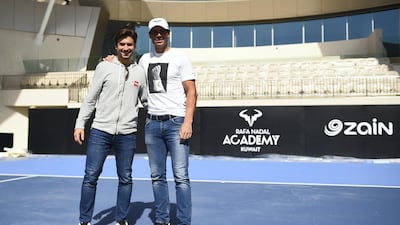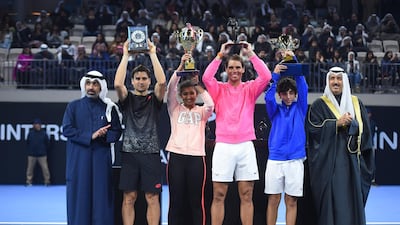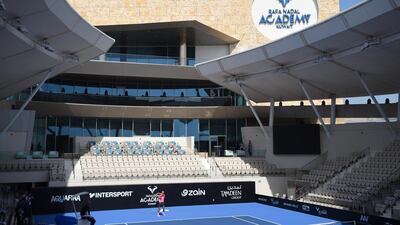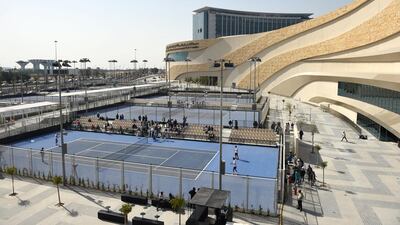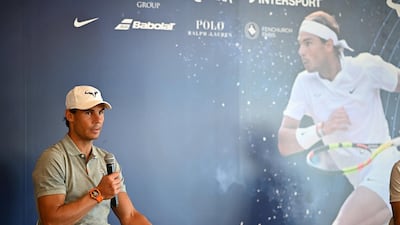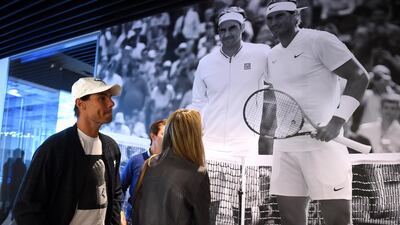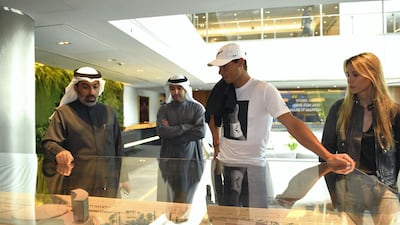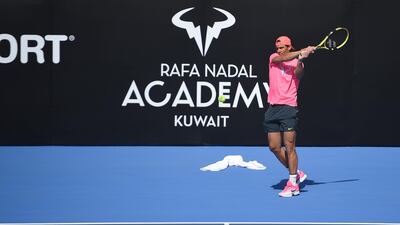For more than 15 years, Rafael Nadal has been coming to the Middle East to do what he does best – compete. Now, the Spanish superstar is here on a different mission, as he looks to grow the sport in the region and help it create its own tennis champion.
Nadal officially launched his new Rafa Nadal Academy in Kuwait City, with more than 1,500 spectators in attendance, by contesting an exhibition match with his friend, compatriot, and former world No 3 David Ferrer.
It is the first fully-fledged academy Nadal has opened outside his native island of Mallorca, and the 33-year-old is thrilled to have found a home for it at the Sheikh Jaber Al Abdullah Al Jaber Al Sabah International Tennis Complex located in Tamdeen Group’s 360 project.
"We were looking for a place here in the Middle East to open an academy. Honestly we believe we can help the region to grow, in terms of promoting tennis, promoting sport and I think we can help the young talents to develop their potential," Nadal told The National during his academy's inauguration.
“So we are super excited and happy and confident because here in Kuwait we found a great group of people, Tamdeen Group, they are super professionals, good-hearted people and we are super happy to be partners with them. We believe that together we can create something special and very positive here in Kuwait.”
The head coach of the academy is Portuguese former top-100 player Nuno Marques, who will have a state-of-the-art facility at his disposal. The complex includes eight indoor courts, eight outdoor courts, the 1,500-capacity open-air stadium that hosted the Nadal-Ferrer exhibition, and a multi-purpose 5,000-seat indoor arena. Nadal says there are also impressive gym facilities, a spa and a medical centre at the venue.
“We sent a couple of great coaches from the Mallorca academy here,” said the 19-time Grand Slam champion.
“It’s important to create the right group of people in terms of coaches, physical trainers … it’s a great group of professionals and human persons, we believe that’s the main thing.
“What we want to achieve is to try to help the kids to grow with the right education, with the right values. Because in sport it’s something great that they can learn a lot of things that can be very positive in life, but at the same time we believe we can help these young talents to become great tennis players.
“The more people are playing here, the more chances to have a Middle East champion.”
While there have been a few Arab tennis players from Morocco, Tunisia and Egypt to make it through to the world's top-50 over the past six decades, the Gulf region has struggled to produce champions at that level. Many nations in the Arab world lack the structure and coaching expertise to develop local talent, and Nadal's academy has the potential to fill that void.
Unlike his project in Mallorca, the academy in Kuwait does not currently have an academic element that would allow student-athletes to live, train and study all in one place. It is a model that is yet to take off in the Middle East, and should it be introduced, can prove to be a real game-changer for the region.
“For the moment the first phase is that the kids can be here and can practice and they have an amazing facility with gym, spa, everything, medical centre … the next step probably will be, yes, they can study but we are going step by step, and the first step is this,” Nadal said.
For Nadal, tennis has always been a family affair, having been coached by his uncle, Toni, his entire life. He hopes to convey that familial feeling to the youngsters training at his academy.
“For us it’s important to be close to the kids, it’s important to be a familiar academy, even if we are big, we need and really want to create a familiar atmosphere,” he said. “We want to be close to the parents, we want to be close to the kids. We want the kids to feel loved by the coaches and the people around the academy.”
A frequent visitor to the Gulf region, Nadal has many positive memories in the Middle East. In 2006, he defeated Roger Federer in the final to win the Dubai Duty Free Tennis Championships when he was just 19 years old. He has competed in the Mubadala World Tennis Championship in Abu Dhabi 10 times, lifting the trophy on five occasions, most recently two months ago in the UAE capital. He also won the Qatar Open title in 2013.
He sees many similarities between the Spanish and Middle East cultures, and is happy to be strengthening his relationship with the region.
“Honestly there are a lot of things that we share between Spanish people and this region. The family union is something very strong in this part of the world and in Spain we have this culture too,” he said. “Family is so important, stay together, support each other. And here it’s something I learnt for the Arabs too is so important, that’s something that I like.
“It’s a region with traditions, that in some places are going a bit slower, other places things have been completely normal and open to the new world. I was able to see part of this normal process that this region is going through and I’m happy that things are opening more and more.”
